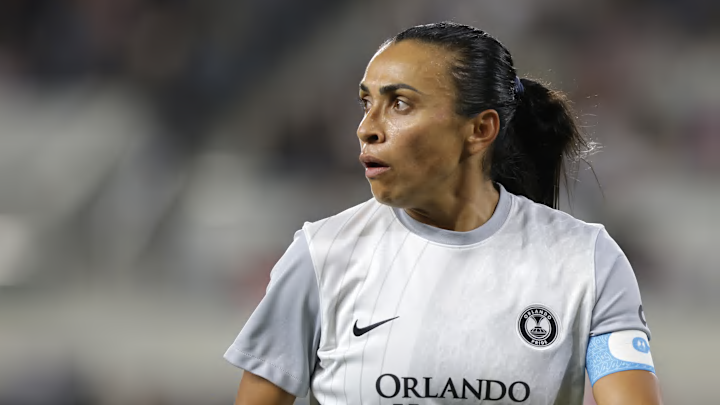When people talk about the "Queen of Soccer," it’s almost automatic to think of Marta. The Brazilian star who, for years, was hailed as the best player in the world, collecting individual awards and breaking records. But is that crown really deserved? This isn’t about discrediting Marta, but about putting things into perspective. And when we do that, it’s hard not to question: why is Marta the "Queen" and not Mia Hamm, a soccer legend who doesn’t receive the same recognition?
First, let’s talk about Pelé, the "King of Soccer." The man who, with his 1,283 goals, three World Cups, and a brilliant career at Santos and the New York Cosmos, redefined what it means to be the best in soccer. Pelé didn’t need exaggerated praise; his achievements speak for themselves. The world recognizes him as the greatest of all time. His reign was never questioned because he ruled on the field. So, why is it different with Marta?
Follow MLS Multiplex on X (Twitter).
Marta undoubtedly made history in women’s soccer. Top scorer in various competitions, five-time FIFA World Player of the Year, record holder for goals in World Cups. That’s undeniable. But if we compare her to Pelé, the narrative falls apart. Pelé was a three-time world champion, while Marta never even lifted a World Cup trophy or an Olympic gold medal. How can we crown her as queen when her reign was never fully realized? And more: how can we compare her to Mia Hamm, who had a much more successful career?
Mia Hamm is a true legend. Two-time World Cup champion, two-time Olympic champion, two-time FIFA World Player of the Year, top scorer for the USWNT for many years, among other individual achievements. On the field, Hamm was synonymous with clutch performances, someone who turned tough games into unforgettable victories. While Marta dazzled with her individual skill, she wasn’t as decisive when her country needed her most, unlike Mia Hamm, who led her team to significant titles. Hamm was, without a doubt, much more decisive in crucial moments than Marta ever was.
And here’s the big question: why is Marta exalted as the "Queen" and not Mia Hamm? When did the media decide that it was Marta who should wear this crown? Could it be that this narrative was created to compensate for the fact that Marta, despite her greatness, was never able to secure the most important titles? There’s something uncomfortable about this insistence on glorifying a player who, though brilliant, always fell short at the finish line. It seems there’s an almost desperate need to elevate Marta, even when she falters on the field, perhaps as a way to validate women’s soccer in a country obsessed with the men’s game.
Honestly, I’ve never seen Marta being criticized on the field the way other players are, even when she recklessly kicked another player in the head (something that isn’t unprecedented in her career), leaving Brazil shorthanded in the quarterfinals and semifinals of the Paris Olympics when her country needed her most. Instead of the media commenting "stay strong, Queen" instead of criticizing her recklessness, they should’ve been saying "stay strong, Brazil" for not being able to count on her once again when the country needed her the most. Frankly, Brazil reached the final in the Paris Olympics despite Marta.
But let’s go further. Why wasn’t the title of "Queen" given to Hamm? The American who broke barriers and opened doors was a central figure in popularizing women’s soccer worldwide. If soccer is what it is in the United States today, much of it is thanks to Mia Hamm. She didn’t just win; she transformed the sport into something bigger, more visible. Marta, despite all her talents, never had that global impact. Her legacy is strong, yes, but it’s limited to Brazil. While Marta fought to stand out in a sport often overlooked in Brazil, Mia Hamm was leading a revolution in women’s soccer worldwide.
There’s something unfair in this comparison. Marta is undoubtedly one of the best players in history. Her individual accomplishments are impressive, but when compared to legends like Pelé and Mia Hamm, the narrative begins to show cracks. Calling Marta the "Queen" seems more like an attempt to fill a gap, a need to create an icon in a country still seeking its place in women’s soccer. But in doing so, we end up disrespecting other legends, like Mia Hamm, who truly achieved everything there was to achieve.
At the end of the day, titles matter. Collective achievements are what really define a player’s legacy. And in that regard, Marta simply isn’t on the same level as Mia Hamm. The American not only won but led her team to the most important victories. Marta, on the other hand, always fell short. Her individual talent never translated into major titles for her teams, and that cannot be ignored. So, the question remains: is Marta really the "Queen of Soccer"? Or are we just buying into a comfortable narrative, a story that doesn’t actually hold up when we look at the facts? Maybe it’s time to rethink this coronation and give Mia Hamm her due. Marta is a great player, no doubt, but maybe it’s time to admit that the crown she wears may not be as solid as it seems. And who knows, the true title of "Queen" might be reserved for another legend, who doesn’t need narratives to validate her accomplishments.
